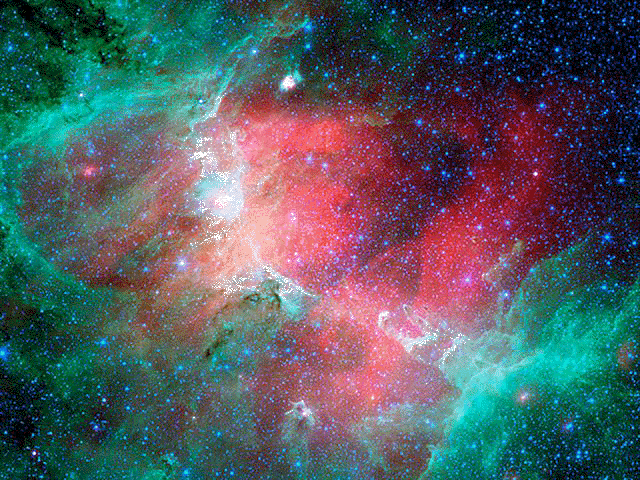The stars in the heavens have always been an interest of mine and I have learned some things about them over the years. Still, I didn’t feel that I knew enough about this topic to write intelligently. Then, I realized that being a little ignorant didn’t stop me from writing any of the other chapters in this book that is great. So, here goes:First, this chapter is about the universe. It is not about facial cream. You should have figured out by now that if you want to learn about cosmetics, you should not be reading anything that Levystien ever wrote.
Second, I will talk about astronomy, not astrology. I am interested in real stars that are millions of light-years away and that burst through the galaxy in brilliant quasars and then condense with such gravity that even light cannot escape. I certainly do not wish to discuss your cousin Vinny’s horoscope for next Tuesday, even if it does suggest that Vinny has a black hole in his head.
Third, and finally, I want to go where no one (rather than no man) has gone before. So, this chapter will be littered with references, if not actual quotes, directly from science fiction.
•
When I was a boy I learned about the stars at the same time that I learned about atoms. It was difficult not to make comparisons. After all, we are on a planet that travels around a sun and an electron travels around a nucleus. Or, perhaps, the entire solar system is like an electron and the spiral galaxy we are in is like an atom. Maybe I was just confusing Atom Ant with Star Trek, I don’t know, but it got me thinking.
What if the entire Milky Way Galaxy is but one atom among billions that make up a hair on the backside of an enormous walrus? Or, perhaps, our atom is on a dust particle and the walrus just knocked us off. Imagine that, our universe is flying away from a colossal walrus! Does that get you thinking?
Maybe the dust particle got knocked off because the walrus is having sex? Perhaps, that is what they mean by The Big Bang? And what about The Big Bang? It doesn’t make sense to me that everything started with a bang at a pinpoint. I understand that the universe most likely has the shape of a ball and is getting larger all the time but why does that mean it all started at a pinpoint?
I was in Colorado Springs yesterday and I saw a brown Lincoln Continental driving south on interstate 25. Why would I assume that this vehicle came from The North Pole? It could have come from Grand Junction on interstate 70 and hung a right in Denver. It could have started its journey in Castle Rock. It could be coming from Trinidad and going north but saw a Village Inn and did a u-turn to go back and get some pancakes. Who knows?
It could be that the universe expanded for billions of years then contracted for billions of years and now it’s expanding again.
Perhaps, it only appears to us that all the objects in the universe are moving away from the same point of origin. I think that even the Hubble Space Telescope may not be a big enough eye to see the universe from the proper perspective?
I think that this big bubble we call a universe was cruising along in one direction when it hit a wall and blew apart. All the matter in the universe is now expanding but only in one direction away from the wall. If we could see the entire universe right now we could appreciate this but half the universe won’t become visible to us for billions of years. The stars that we can see, from billions of years ago, seem to be going the other direction.
In any case, I think that 13.7 billion years ago there was no Big Bang. On the other hand, I know for a fact that there was a Big Bang 13.7 months ago when I met my fiancé. I would even go so far as to say that it was an out of this world cosmic experience. I hope that makes up for the suck/screw fiasco in the introduction.
Why don’t we go the other way? Do you think that there is a tiny little civilization living on a planet that circles a sun that is in a spiral galaxy that appears to us like one of billions of atoms that make up a single hair on Levystien’s backside? I just remembered. I actually got this idea from Dr. Seuss...sorry.
Do you remember Horton!
Don’t you remember the elephant that carried around a spec of dust? Deep inside the spec was a planet on which was a city called Who-ville where all the little Whos lived and no one else but Horton could hear them so everyone Horton met kept trying to destroy the Whos and Horton kept saying, “A person's a person, no matter how small.”
I hope that Dr. Seuss got this idea from a legitimate cosmological source and that I’m not writing a chapter on cosmology that is based entirely on a children's book. Actually, it doesn’t really matter. But while we are on the subject, what do you think the Whos would call the beginning of their universe? Perhaps, they would call it the wee, wee wittle bang.
Aristarchus Of Samos
My discussion of cosmology has gotten a little off track. Let’s start over and this time let’s start at the beginning. Let's go all the way back to the third century before Christ. Let’s talk about the amazing discovery that the sun is the center of the universe and the Earth revolves around the sun. Let's talk about that magnificent astronomer, and 232BC man of the year, Aristarchus Of Samos.
Surely, you’ve heard of him? Oh, yeah, I forgot that 100 years later Ptolemy described his geocentric (Earth centered) view of the heavens and everyone liked it so much better that Aristarchus was left to burn in the ashes of history. We don’t even have his original manuscript. We only know of it because of references to it in other writings.
It wouldn’t be until 1543, fully 1770 years later, that the first copy of the book On the Revolutions of the Heavenly Spheres would be placed in the dying hands of Nicolaus Copernicus.
Oh, how fortunate he was to be dying. Did you know that he was a Catholic priest? He even said, “The idea of the sun being the center of the universe should not have significant religious ramifications.”
Try telling that to Galileo Galilei, the guy who sucked up the church’s rath for advocating Copernicus’ ideas. Incidentally, the Orthodox Christian church in the east never had a problem with Galileo. It was pretty much just a papal thing.
But, for his trouble, history remembers Galileo as the father of astronomy. Hell, history even remembers him as the father of SCIENCE! The Earth not being the center of the universe is considered by many to be the greatest scientific discovery ever, but not because it was all that brilliant of a discovery. Remember, some guy had done it almost two millennia earlier.
The reason that putting the sun in its correct place was the greatest discovery of all time is because it changed our view of everything. From that point forward we started investigating all sorts of things and running experiments and examining the natural world with a vigor that had never been seen before. It really was Galileo’s advocacy of Copernican theory plus his famous, and I think unintentional, papal ridicule that jump started the engines of science.
Once the sun was in its correct alignment, everything else fell into place. Newton elegantly described simple physics such as gravity. He poignantly observed simple mechanics and recorded rules for objects in motion. He invented a new math to calculate these new observations and called it calculus. Then, he demonstrated how these simple laws of nature also applied to heavenly bodies. For example, an apple falling to the ground is obeying the same natural law as are the planets in their path around the sun.
The world was just getting comfortable with Newtonian physics when Einstein turned everything upside down. He said, “At really long distances and at really high speeds Newtonian physics breaks down.”
Einsteinian physics then completed the laws of nature and we ended up with space that is warped, distance that is time, and mass that is energy. Now, everything in the cosmos could be accurately calculated. We began looking to the heavens and making equations and really understanding our place in creation.
Well, not everything could be accurately calculated. Little bitty tiny things like atoms failed to follow Einstein’s commandments. Max Plank figured out that an atom is made up of particles that contain discrete quanta of energy and Werner Heisenberg pointed out that these particles possess a quality that was abhorrent to Einstein... UNCERTAINTY .
Hmmmm… uncertain little quantas of energy. What in the hell is so uncertain about them?
Uncertain means that you can’t accurately measure the position and speed of an electron at the same time. If you pinpoint a measurement of speed, then you have to settle for a range of possible locations and vice versa. This introduces another anti-Einstein concept... PROBABILITY . Thus, to explain the physics of the very small you need to employ uncertain probability calculations. In other words, we have to accept that the universe is not only unusual but is actually bizarre.
When we finally accepted that the Earth was not the center of the universe we began questioning many other previously held notions. Now, we find out that;
God does shoot craps!
This means that we have to accept that a totally weird and seemingly preposterous explanation of everything is actually true and real. This means that our questioning of the universe must extend to any notion that you could possibly fathom in your wildest imagination. Like the notion that God not only plays dice but also makes beautiful music. (More on this in a moment.)
We have yet to reconcile classic and quantum physics. We do not have one unifying theory of everything. What works in the cosmos fails in the nucleus and vice versa. You would think that because there is only one everything, there should be only one set of rules that governs it all. You would think…but, wait…I’ve got an idea. A radically revolutionary idea. Something totally different to explain everything. Here it is: There is NOT a theory of everything.
A theory of everything impies that the universe makes sense. Perhaps, the universe at its most basic level is formless and void. Sort of like Stupid Levystien.
Consider this question: “Does an electron really have a single position and corresponding speed and we just can’t figure out how to measure it or does it really exist in a fluid state of flux?”
Applying this principle to everything, let me ask it this way, “Is there really an equation that accurately explains everything or is the universe a dynamic place that changes and evolves and ultimately can’t be type cast as a single entity?”
There is no theory of everything!
OK, let's say that the universe is fluid and dynamic, still, what do we really want to know about it?
We want a theory that can accurately describe probability calculations on a sub-atomic level and, at the same time, can describe the warping of space on a macro level. We want to know how the universe began and how it will end. We want a physics that describes what happens in a singularity, like a black hole. We want to understand the most fundamental building blocks, or rather building vibrations, of matter. We want to know what the dark, or non-visible, part of the universe is made of and what forces are out there that we don’t yet understand but that counter balance gravity to the point of causing our universe to be in accelerated expansion.
But we don’t give a rat’s ass whether or not there is microbial life on Mars.
Why are we so interested in these things?
Stephan Hawking frequently ends his talks by saying something like, “Mow..ow..or..sii.” No, just kidding. He actually says something like, “Now, this may give us a glimpse into the mind of God.”
I, too, like to think and to dream and to imagine. We are living in a time when we are discovering things like an expanding universe and this is phenomenal to me. I used to read science fiction as a young boy and it would inspire me to dream. At that time, I wasn’t so aware of the reality of science and how it was rapidly changing our understanding of everything.
I still crawl up on the sofa and read sci-fi every so often but, at this point in my life, it’s Stephen Hawking that really turns me on. Actually, it’s Brain Green talking about Stephen Hawking that turns me on, but you get the point.
So, who is really the best science fiction mind of our time? I think the answer to this question is undoubtedly Robert A. Heinlein. I would make a strong case for my beloved Gene Roddenberry but I think that Isaac Asimov, Frank Herbert, Arthur C. Clarke, and Alfred Bester would round out my top five.
George Lucas would be on the list but he decided to wait twenty years to finish the last three episodes of Star Wars thinking that they would be better due to improved special effects. In fact, they were worse due to improved special effects. His reliance on special effects reduced his reliance on his own creativity and the final three installments turned out worse than the first three. That’s just Stupid Levystien’s opinion.
Science fiction must have a plot, story line, characters, places and events that are creative and interesting in order to be good, but what makes it great is the way in which it expresses its allegory. For example, it was good when Luke blew up the Death Star, but it was great when Darth Vader said, “Luke, I’m your father.”
Instantly, we understood that the evil one was also the good one and that “balance in the force,” meant that evil is as much a part of the universe as is good. Despite our desire to see everything as black and white, everything is really very gray. It makes you ponder the question, “If everything really was black and white, how boring would that be.” That’s great Sci-Fi!
But, what about Sci-Fa? I mean, “What about Science Fact?” Does science fact relate in any way to life?
Of course it does and so much better compared to Sci-Fi. For example, the real live smartest man on our planet told us about warped space and about space-time and about mass-energy. Then, he summarily dismissed quantum physics because, to him, the universe was calculating and exact. He could not accept that the laws of nature were left up to probability calculations. Guess what? He was dead wrong.
I relate to this story because I think that I am the smartest man in the world and, yet, I find out all the time how wrong I am. Because of Einstein, being wrong does not necessarily mean that I am not smart. That is, unless I put too many double negatives in one sentence.
Another example of how Sci-Fa relates to life has to do with the fact that a black hole is neither black nor is it a hole. The life lesson here is that what we perceive as real, and what is real, are frequently not the same.
The story of black holes goes something like this:
From Earth we see a place where objects like planetary systems are pulled or tugged by some massive gravitational field but the location where the matter that is producing this field should be is empty or black. We call it a “black hole.”
In reality, there is an entire cosmos inside this area that might have suns and stars and planets and who knows what else. Due to the fact that light cannot escape, I’m thinking it ain’t black inside a black hole. It might just be so bright that you have to wear shades!
And what about Strings?
Again, strings are not really strings. There is not an endless cotton fiber that engulfs the universe. Strings are actually vibrations. The idea is that instead of the universe being made out of cold hard matter, everything is an illusion of sorts created by vibrations of different frequencies.
Imagine that you get smaller and smaller and smaller until electrons look like universes and even quarks and leptons are large. Then, just like an onion that peels away to nothing, at the smallest level instead of a particle of matter you discover vibrations.
Good, good, good vibrations.

She’s bop, bop excitations…
Not really matter, as we like to think of it, but vibrations. Vibrations are the most basic building blocks of matter. The frequency of vibrations determines the alignment and even the identity of all matter.
An electron is an electron because a string is singing the song of the electron. Hydrogen is hydrogen because the song of hydrogen is being sung at the tiniest level. Steel is steel for the same reason. The Golden Gate Bridge is what it is because symphonies of vibrations say that is what it is.
I spent my whole life thinking that my head was a rock and I come to find out that it’s a beautiful melody.
All of us, except Einstein, accepted that God rolls dice, but now we find out that he plays the harpsichord. How about that?
It’s so fucking beautiful that I get a chill when I think about it.
Do you still think that sci-fi is prettier than sci-fa?
When I arrived at the ending of Stranger In A Strange Land and found that the protagonist, who was raised on Mars and only arrived back on Earth as a young man, turns out to be the Archangel Michael and that he gives himself up to the violence craving Earthlings as a sacrifice, I felt multiple emotions all at once.
This is perhaps the greatest work of science fiction ever created by a human mind. It changed the way of thinking for an entire generation back in the 60’s.
But it pales in comparison to the very real thought of actual tiny vibrating strings that paint our universe.

The Eagle Nebula
I hope that you can see the beauty in what is real. To me, it is the meaning of life.


